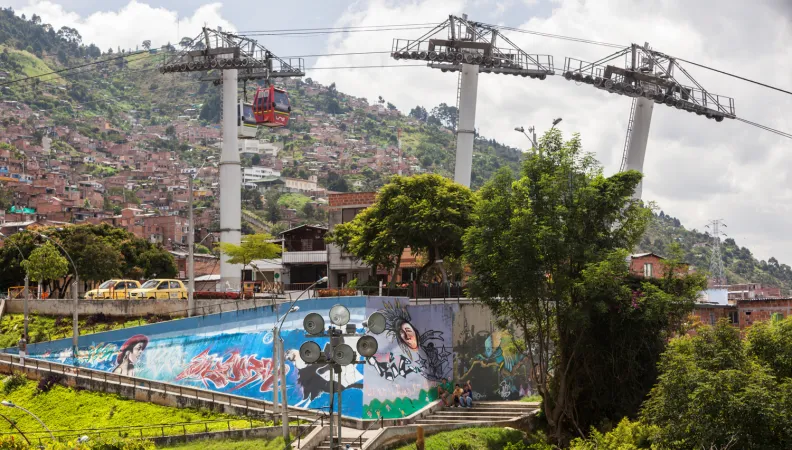Share the page
The Transit Oriented Development approach for reducing GHG emissions in Colombia
Project


-
Project start date
-
Status
Completed
-
Estimated date of project termination
-
-
Project financing date
-
-
Financing duration
-
3 years
-
Type of program
-
FFEM
-
Global financing amount
-
€ 21 150 000
-
FFEM financing amount
-
€ 1 150 000
-
Project lead member institution(s)
-
AFD
-
Country and region
-
Colombia
-
Location
-
Cali
-
Type of financing
-
Partners
-
GIZ
-
Beneficiaries
-
Municipalité de Cali
-
Type of beneficiary
-
NGO, Foundation



Promote inter-institutional cooperation for more inclusive, transport-oriented urban development to enhance accessibility and reduce greenhouse gas emissions.
Context
Colombia is an emerging country marked by deep socio-economic inequalities. Despite having low greenhouse gas (GHG) emissions—thanks to an electricity generation mix that is largely decarbonized—transport remains the main source of CO₂ emissions in the country. Moreover, transport-related emissions have been steadily increasing in recent years.
Among the many public policy initiatives aimed at combating climate change in the transport sector, two interventions have particularly drawn the attention of AFD: the national NAMA-TOD program, developed by Findeter and the Center for Transit-Oriented Urban Development Interventions (CIDAT), and the Green Corridor project in Cali, led by the Municipality of Cali and the Fundación Gerencia Innovación de Proyecto (GIP), acting as the delegated project owner.
These two initiatives benefit from strong political support and are backed by a clear vision and innovative strategies. At the national level, the Sectoral Mitigation Plan (PAS) for the transport sector includes the NAMA-TOD program as one of five international cooperation projects. Locally, the Green Corridor stands as the backbone of the new urban development model proposed by the city’s recent Master Plan for Urban Development (POT 2014), which promotes dense and compact urban growth, a green and connected city with low emissions, and the development of active mobility and public transport.
Description
The project is structured around four components:
- Financial structuring and investment planning for TOD projects
The objective is to equip these investment projects with robust implementation frameworks by developing detailed action plans to guide and support project owners at both national and local levels. - Support for the design and social-environmental integration of the Green Corridor
The Green Corridor, a flagship project of the city of Cali, reflects a strong political will for comprehensive urban renewal that promotes environmental sustainability, social inclusiveness, and long-term economic growth in Colombia’s third-largest city. The study covers a 200-hectare area, including the footprint of the disused railway and the influence zone of the corridor, encompassing adjacent roads and built-up areas. - Capacity building for impact measurement and monitoring-evaluation systems
Technical assistance is provided to: (i) assess capacity-building needs; (ii) evaluate the current monitoring indicator system; (iii) design a capacity and indicator system strengthening plan; and (iv) implement immediate actions where necessary. - External monitoring and evaluation of the FFEM support project
Outcomes
The FFEM Support Project:
- Play a key role in the successful implementation of Colombia’s climate change mitigation strategy through the development of urban projects driven by sustainable transport and active mobility solutions.
- Support activities with a catalytic effect on the effective implementation and scaling up of Transit-Oriented Development (TOD) initiatives.
- Contribute to the operationalization of a new instrument that anticipates the evolution of the international climate finance architecture.
Innovative and exemplary features
The support project represents a first-of-its-kind initiative for both FFEM and AFD in backing a NAMA project— a new bilateral facility established by the German and UK governments to finance nationally appropriate climate change mitigation actions. It enhances the effectiveness of this mechanism by funding a preparatory study that provides concrete operational solutions for the development of a dedicated financing window for Transit-Oriented Development (TOD) initiatives in Colombia.
At the Cali city level, the Green Corridor project is innovative not only as a TOD initiative but also in its original phasing approach: first establishing a corridor that promotes active mobility and urban densification through leisure and circulation infrastructure, before moving on to develop a public transport axis.
Sustainable Development Goals
ODD11 Sustainable cities and communities

ODD13 Climate action

ODD17 Partnerships for the goals



